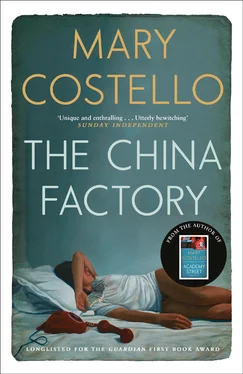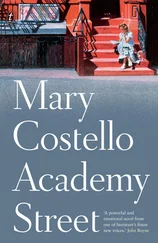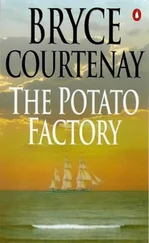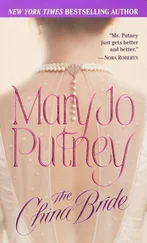She knelt down and touched small purple flowers that she had never seen before, and it seemed a shame to pull even one. When she looked up, Hughie’s eyes were on her again and he smiled and something stirred and swelled and dropped inside her. She smiled back and felt suddenly drenched in his smile and in the light and the blueness of sky. She sat back and placed her palms firmly on the heather, to steady herself. He left down his fishing rod and turned to get bait from the jar. She kept her eyes on him, her chest rising and falling, her heart egging her on. She crept over the heather and leaned in and pounced on the rod and made off with it. He jumped up and ran after her, round and round. She moved fast, the rod high over her head, laughing. She ran through the heather and the long grass and around the lake’s edge and then he caught her by the hem of her dress and brought her down. He was lying on top of her, breathless. The heather scratched her upper arms. The laughing stopped. His eyes were hazel, dappled with green. Speckled eyes, you have, like a speckled thrush, she thought. He searched her face, then stroked it with his finger. He lifted her hair and touched her neck and shoulders and she felt every part of her gather and rise to meet his touch. They pressed hard against each other, and his body frightened and delighted her. Her own wanton body ached and opened and every cell in her belly, in her womb, cried out for him and she could not have stopped it, she could not have stopped it.
Then it was over and he was lying in his white vest and open trousers on top of her. He pulled away but his face had darkened. After he had put on his shirt he looked down and saw that he had buttoned it wrong and a look of unbearable sadness came on him. They did not say anything and he went back to his fishing and she to her book, and she was filled with terror and shame at what had just happened. But then later, as they were leaving, he said, ‘I’m going to get you a pup, for next summer,’ and he took away some of her shame. She would have liked him to hold her hand or kiss her hair, or something, before they went back down the mountain.
She wrote to him in the fifth month — a letter full of apology and dread and small proffered hopes — and again in the seventh. She thought he would come. In the ninth month she sat her final exams and imagined that he had never got the letters. Her mother came to the city to talk to her. Her friend Kathleen Doran from Monaghan got her through it, and, afterwards when she got a teaching job, Kathleen and Kathleen’s younger sister took turns minding the child.
It could have gone on like this. She could have lived in the city and raised him, and it would all have come right in the end. But her father fell ill and a job in the local school had her name on it and someone, somewhere — her mother maybe, or an aunt in America — thought that it all fitted, that it all made sense. And she was young and torn with doubt and guilt and duty. And on a wet Belfast evening in November, when he was eighteen months old, she handed the child into the arms of her mother’s cousin, a childless woman in her forties, visiting from Boston. The husband, a tall handsome American, stood guiltily in the background. Legal papers followed a few weeks later. She went back to the flat that evening and cut off her long hair and walked the city streets that December under bright brutal skies, past gardens with bare trees whose beauty almost broke her, past people who gazed at her and could not have known what she knew, or felt what she felt. Her father died two months later and Hughie Sweeney began to walk out with Marie Gallagher and within three months she was back in the stone house set into the hill, the daughter, the teacher, the breadwinner. And that was that.
*
Her mother never spoke of it and Manus never knew. She saw the child everywhere — in the small boys who walked through the school door every September; in Manus’s long straight back and serious face, in the elaborate wallpaper with the peacock which she and her mother hung in the sitting room and which would hang there for decades, a constant reminder of the visit to Belfast Zoo one Saturday and the peacock that had duly obliged and unfurled its feathers for the mother and child.
Once, ten years or so later, she confronted her mother. She remembers the moment: a winter’s evening, Manus sitting at the table reading his library book, her mother sewing a button on a coat, the television on. Manus got up and went outside, the way he did some nights after reading, as if to recover from the contents of his book. Alice had been watching Hawaii Five-O . And Steve McGarrett, as he did every week close to the end, turned to his partner and with a wry contented smile, delivered his catchphrase, ‘Book ‘em, Danno,’ and then turned and skipped down a flight of steps and disappeared off camera. And she saw the child in that instant, as she did every week, after every episode, saw him sitting with a father in a front room with a picture window bearing onto a lawn with sprinklers, and a mother making popcorn in a kitchen with wooden cabinets and a big fridge, and then the child getting up and turning to that father with a broad happy grin, and pointing a finger and calling out ‘Book em, Danno,’ and the two of them tipping and gripping and thumping each other as the credits rolled, all high fives and low slaps, all confidence, all American, and all she ever had to reimagine him, to re-envisage him, to cling to, every single day and night and week of this miserable life.
‘Did she ever write?’ she asked her mother that evening.
‘Who? Did who ever write?’
‘You know well who,’ she said coldly. ‘Was there ever a letter or a card or a photograph?’
‘No.’
‘Nothing? Ever?’
‘Nothing.’
And then out of the blue, years later, a month before her mother died, a visiting American relative sitting in the kitchen one day said ‘Ellen’s son trained as a lawyer, you know. He qualified last year. He’s with a big firm in Boston, I believe.’
She had been turning towards the sink to fill the kettle and all sounds dissolved behind her and then, to steady herself, she looked up and out and a long slender bird, like a heron, was flying past the window.
She had packed his things that morning and handed them over as if they had never been hers. She had written a long list of things that he liked and needed — how buttons, tags and cuffs made him itch, how he liked to touch the edge of his serge cotton blanket every day, every night, every moment, and look out the window first thing in the morning to check that the earth was still there — a list written and discarded and rewritten many times because it made her frantic and insane.
The couple had hired a car and were touring around Ireland. They did not want the pram. They sailed on a liner from Cobh. She thought there might be dolphins for him to watch. She thought of him on the deck of the ship scanning their faces for some trace of her, fingering the wool of his Fair Isle jumper, making concentric circles on his tummy with his index finger, as he looked out from a small, grave face. At the last minute before they left the flat he had pointed to a shiny green apple sitting on the dresser, and later she thought of this and saw significance in it, saw significance in everything. She had taken the apple and placed it in his hand and as they rode in the taxi he bit into it with his small new teeth and left little nibbled marks on the tough skin. Then, as they pulled up at their destination, he looked into her eyes for several seconds and silently, meekly, handed back the apple. This act remained with her forever. At the front door of the flat two nights later, feeling around inside her handbag for her keys, she touched the apple’s cold skin. She unlocked the door and stood under the bare bulb in the kitchen and stared at the apple, at the little bites and teeth marks, and the current ran out of her, and she thought then that she would rather have had her head cut off.
Читать дальше












